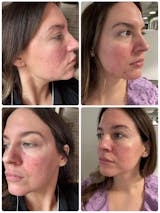
? This girl is on fire ? - but her skin should not be.
Stinging, burning, inflamed.
These are uncomfortable sensations we might have experienced more than once, especially when we have sensitive skin.
While a little tingle that lasts a few seconds is nothing to worry about, when it becomes a sharp sting that’s almost unbearable, it’s a sign something’s wrong.
Skincare should not be painful, and no, the stinging should not be embraced as a sign the product is working.
So, why is your skin stinging when applying a product? Here are some possible reasons:
#1 You Are Exfoliating Way Too Much.
While exfoliation can be a great addition to your skincare routine, helping reveal brighter skin and reduce clogged pores, too much of it can lead to a damaged skin barrier.
Your skin barrier is the outermost layer of your skin, and plays the very important role of defending you from environmental threats such as bacteria and UV rays. When this protective barrier is compromised, your skin can become raw and sensitive, giving you that stinging sensation you wouldn’t otherwise feel.
How to Fix It: Stop exfoliating with harsh scrubs that can cause micro-tears in your skin and avoid exfoliating too frequently, especially if you're new to skincare and your skin hasn't yet acclimated to it. Instead, opt for a gentle chemical peel, such as with the Balancing Cleanser, once a week. Every morning and night, apply the Protective Moisturizer, which has been specially formulated with peptides and antioxidants to repair and re-strengthen your skin barrier.
#2 You Have Dry and Dehydrated Skin.
Dry and dehydrated skin is also a sign of a weakened skin barrier because the barrier is what keeps your skin from losing much-needed moisture. If your skin feels dry or is peeling, or even cracking, you might feel stinging when applying products.
How to Fix It: The key is to return and retain the moisture in your skin. Use a gentle cleanser such as So Fresh, which won’t over-strip skin of its natural oils, and follow with the nourishing Protective Moisturizer. For extra hydration, layer on the Matte Hydrator before applying the Protective Moisturizer.
#3 You’re Having a Reaction to an Allergen or Irritant.
When your skin stings after applying a product, it most likely means your skin does not agree with one or some of the ingredients in it. Possible allergens and irritants include fragrances, dyes, and fruits such as lemon and grapefruit.
Everyone’s skin is unique, so what is perfectly safe for others might not be for you. If you’re constantly experiencing irritation from different products, it’s best to check for any common ingredients that could be the culprits.
How to Fix It: Immediately wash the product off your face and gently pat dry. Then, try and identify what it is that could be causing the negative reaction so you can remove it from your routine moving forward. Always check the ingredients list for potential offenders before purchasing new products and always do a patch test before applying them to your entire face – just to be extra safe!
To patch test, apply the new product on the skin right behind your ear or on the inside of your wrist. These areas are best because they more closely mimic the skin on our face, which is thinner and more sensitive. If you do not see or feel any signs of a negative reaction after a day, you can try applying the product on your face.
#4 You’ve Just Started Using Clear Out.
Our top acne-fighting lotion, Clear Out, uses medical-grade retinol to promote the shedding of dead skin cells and flush out clogged pores.
How to Fix It: Slowly introduce skin to retinol by applying Clear Out on alternate evenings. The stinging sensation should not last more than a few seconds. Once skin has adjusted and the stinging is gone, you can safely apply Clear Out every evening.
Not sure if the stinging you’re experiencing is normal?
Send any questions you have our way via Messenger chat or Instagram DM (@clearlybasics). However, if stinging persists for more than a few minutes or becomes too much to handle, check in with your dermatologist as soon as you can!
Disclaimer: This article should not be interpreted as personal medical advice. For medical-related matters, please consult your dermatologist.






